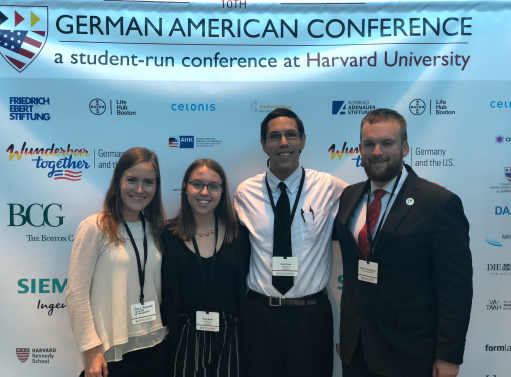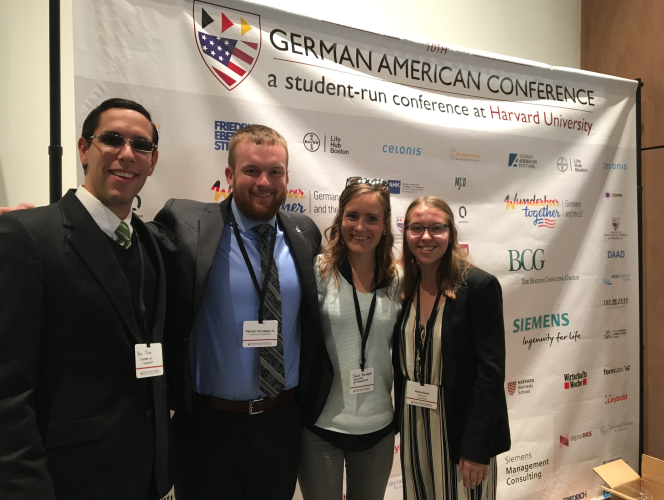Student group led by Isabel Choinowski (M.A. candidate), instructor of “German for the Professions”; report written by Alena Hauer, Patrick Kornegay & Bret Olson
 The German American Conference is the largest-student led conference in the United States. The conference tackles transatlantic challenges and issues by inspiring leadership, fostering dialogue, and promoting innovation. Harvard hosts all three days of the gathering, one at Harvard Medical School and two at the Harvard Kennedy School. More than 15 panels were spread out over the three days on topics ranging from education to digitalization in sports to migration. There was also an Innovation Lounge that offered participants an opportunity to rethink challenges in creative ways. Exhibitors like Siemens, the Goethe Institut, and the Boston Consulting Group participated in the Innovation Lounge. Over 80 speakers from politics, industry, and academia spoke at the conference, including the Permanent Representative of Germany to the United Nations Christoph Heusgen. About 700 people, of which many were German young adults studying or working in the US, attended the conference. The conference truly bridges the transatlantic gap between Germany and the United States, and we thank the UConn School of Business and the CIBER Institute for the opportunity to attend the conference.
The German American Conference is the largest-student led conference in the United States. The conference tackles transatlantic challenges and issues by inspiring leadership, fostering dialogue, and promoting innovation. Harvard hosts all three days of the gathering, one at Harvard Medical School and two at the Harvard Kennedy School. More than 15 panels were spread out over the three days on topics ranging from education to digitalization in sports to migration. There was also an Innovation Lounge that offered participants an opportunity to rethink challenges in creative ways. Exhibitors like Siemens, the Goethe Institut, and the Boston Consulting Group participated in the Innovation Lounge. Over 80 speakers from politics, industry, and academia spoke at the conference, including the Permanent Representative of Germany to the United Nations Christoph Heusgen. About 700 people, of which many were German young adults studying or working in the US, attended the conference. The conference truly bridges the transatlantic gap between Germany and the United States, and we thank the UConn School of Business and the CIBER Institute for the opportunity to attend the conference.
Panel “Transatlantic Security”: Major issues continue to develop in the transatlantic partnership. One of those is Article V being called into question (Financial commitment to defense spending) and a major question presented is how can we go forward with the current issues in national security with cyberterrorism and Russia? We need more cooperation with Europe as the alliance is under stress from both sides of the Atlantic and there are several weak points that need attention. The complicated set of relationships that comprise the alliance deals with issues such as: How are both sides dealing with challenges within the alliance and how can we respond to aggression? Some vulnerabilities are self-inflicted (such as defense spending) and nostalgia should not be a basis for policy. Both Germany and the United States are key pillars for European security and that relationship should continue to be strengthened, and Germany needs to take on a more direct leadership role within the alliance as well as with foreign policy. Two different strategies comprise the alliance that continue to be debated: strategic patience and strategic autonomy, with NATO leadership needing to figure out the best option for dealing with whatever challenge comes its way. European integration needs to be as much as necessary and not as much as possible. We’re not talking about more exits with issues like Brexit and that needs to be known. There is a new frontline that we are facing now: authoritarianism challenging constitutionalism and separation of powers. A question I presented was how much of a role does the US-German relationship play in checking Chinese aggression in the South China Sea. Answers to this question were that there are enormous trade interests in the region, so Germany would definitely want to be a player but that doesn’t mean that Germany has to send a carrier battle group there, but there should definitely be a strategy with regards to the region. Germany should think to do what’s best in Germany’s interests when it comes to making decisions with its role in the alliance.
Panel:“Future of Work – Man or Machine: Are we prepared for the future of work?” One of the many panels at the German American conference in Boston was “Future of Work – Man or Machine: Are we prepared for the future of work?” which occurred on Saturday, October 6, 2018 at 1:45 PM. Upon the start of the panel, it was standing room only. It seemed that a lot of participants were interested in this panel, including myself. There were four panelists and a moderator. The panelists included a MIT economics professor from Germany, a University of Zurich business economics professor, a German politician from the SPD, and a lawyer from Germany. The largest topic was the effects that Artificial Intelligence may have on the world of work. One of the first questions was if the panelists thought that the use of AI was an opportunity or a challenge. 3 of the 4 panelists thought that it was an opportunity, if done right. One panelist thought that it was both an opportunity and a challenge. It was discussed that there was even a trend in certain areas after a form of AI was introduced. ATMs in the banking industry was used as an example. A panelists stated that once ATMs were introduced, the demand for bank tellers went up. My personal understanding was that the demand would go down because of how the job was being replaced by a machine. However, the argument was that the job description of a bank teller was changed after the introduction of ATMs. It was also a matter of change and how people in the world accept the dynamic nature of technology to improve the workforce. The caveat was if we, as a population, do it right and use AI as a beneficial progression of the future. The general idea was that Artificial Intelligence is the future of work, and it will serve to move the world forward.
